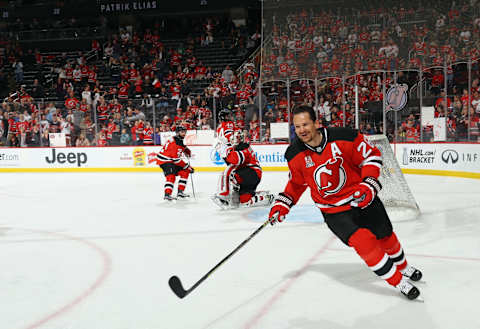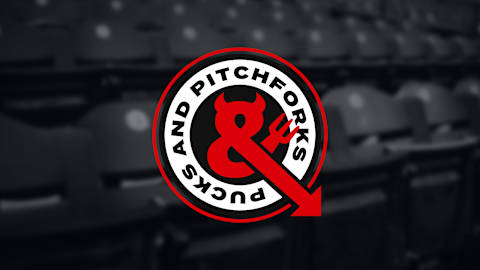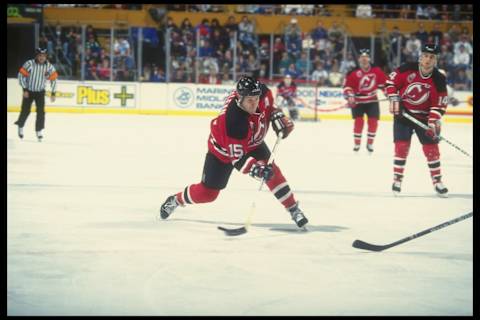Definitive New Jersey Devils Mount Rushmore Of Forwards


Mount Rushmore represents four American presidents who helped signify the true symbolism of our country through dedication and perseverance. All four presidents in some way helped transcend our country to what it is today. When thinking about the history of the New Jersey Devils, more often than not people will bring up Martin Brodeur, the team’s stingy defense and most importantly three Stanley Cup championships.
Lost in the shuffle are an abundance of talented forwards the organization has had since its inception in New Jersey back in 1982 who have helped mold the success of the organization. Two forwards are fairly obvious in the team’s success, whereas picking the other two are not as easy.
Patrik Elias
Patrik Elias is the most prolific offensive forward in Devils’ history. He leads the organization in every major statistical category, ranging from goals (408), assists (617), points (1025), power play goals (113) and game-winning goals (80).
No other player, active or retired is even close to those totals. Elias was a catalyst for one of the leagues highest scoring teams in the early 2000’s while playing on the franchises most prestigious offensive line (The ‘A Line’, along with Jason Arnott and Petr Sykora). His goal in the final moments of Game 7 in the Eastern Conference Finals against the Philadelphia Flyers back in 2000 helped erase a 3-1 series deficit to lead the Devils to their second ever Stanley Cup Finals appearance.
Not only did Elias light up the score sheet, he also played a great two-way game. He was also a fierce fore-checker, back-checker and penalty killer. His number is hanging in the rafters of the Prudential Center and comfortably will hold every offensive record for a long time.

Kirk Muller
Kirk Muller is arguably one of the most talented centers in franchise history. Muller was part of the franchises rise up the ranks from obscurity in the late 80’s along with John MacLean, Brendan Shanahan, Aaron Broten, Pat Verbeek and Ken Daneyko. Muller helped bring excitement to a Devils club starving for a winner. ‘Captain Kirk’ became a leader the Devils needed with his strong two-way game, special teams and feisty play. He still ranks 6th in goals in team history, 4th in points and 3rd in power play goals.
Muller, like many other Devils, had butted heads with general manager Lou Lamoriello over contract negotiations prior to the 1991-92 season. Lamoriello made it a point to prove that no player was bigger than the team. Whether Muller was to be made an example of or not, he was eventually traded to the Montreal Canadians for Stephane Richer and Tom Chorske.
Those two players played key roles in winning the franchises first ever Stanley Cup in 1995. Who knows what could have been had Muller not been traded, but he left his presence felt for many years. He helped the franchise transcend into a winning organization, even though he was not part of the 1995 Stanley Cup winning team.

Claude Lemieux
Claude Lemieux is one of the most clutch players to ever wear the red and black uniform. Acquired for Sylvain Turgeon in 1990, Lemieux made his presence felt immediately with three straight 30-plus goal seasons, including a 41-goal campaign in the 1991-92 season.
Lemieux immediately became a fan favorite not just for his offensive prowess, but also his physical brand of hockey. He had a way of energizing the team with a big hit, or getting under the skin of his opponents. Following a disappointing shorted season during the 1994-95 regular season, he turned on the light switch and became a man possessed during the team’s quest in winning their first Stanley Cup in 1995.
Lemieux’s prolific slap shot took full reign in the playoffs, perhaps none bigger than the game winning goal in a pivotal game 5 against the Philadelphia Flyers. He scored an astounding 13 goals that summer, along with three game winning goals. Lemieux would go onto winning the Conn Smythe Trophy as the playoff MVP. His two month scoring binge is unlike any hockey we have seen from a Devils forward.
Later that summer, Lemieux and the team were involved in a nasty contract dispute that would eventually see the hero of the 1995 playoffs traded. It was not so much a goodbye as it was so long, as he was later re-acquired during the 1999-2000 season for Brian Rolston. He played very well in his return to New Jersey and helped bring Lord Stanley back to the Garden State for the team’s second championship in 2000. While his numbers are not as gaudy as other players in franchise history, he is one of the most clutch.

John MacLean
Before there was Patrik Elias, John MacLean was the franchises all-time leading scorer. He still possesses the second most goals (347) and points (701) in franchise history. To put his numbers into context, he has 145 more goals and 169 more points than the next players on the list in those respective categories.
MacLean scored one of the most important goals in franchise history that clinched their first every playoff berth in 1988. MacLean is also the only Devil to record three 40 goal seasons with the club. MacLean helped transcend the Devils from a hapless organization into Stanley Cup champions. Some fans may have a case of recency bias that saw MacLean force his way out of New Jersey with his trade demand and his head coaching tenure was nothing short of a disaster. Let’s remember MacLean for all the good he brought to the franchise as the first player enshrined in the team’s Ring of Honor.
Honorable Mentions
Honorable mention goes to Pat Verbeek and Travis Zajac. Verbeek was a feisty, goal scoring machine from the mid-late 80’s who held the Devils’ single season goal mark for almost 20 seasons before Brian Gionta broke the record in 2006. Who knows what Devils records he would hold had he not been traded because of a contract dispute with the club. His 170 goals with the club ranks 7th of all time. He finished his career with 522 goals and amassed over 1000 points.
Travis Zajac is climbing up the offensive ranks in franchise history. While impressive, Zajac is probably the least skilled player listed in the article. However, what proves invaluable is his durabilty, dedication to the club and his flexibility. He could play on the first or second line and provide a scoring touch, or play the tough minutes on the checking line against other teams’ top players. He is a prolific penalty killer and is a respected player within the organization. If not for his goal that forced a game 7 against the Florida Panthers in the quarterfinals, the team would not have gone on to their 5th Stanley Cup Finals appearance.
Next. Devils 5 Worst Free Agent Signings Of All Time. dark
Patrik Elias, John MacLean, Kirk Muller and Claude Lemieux all played a big part of the franchises success. Some may not have been the longest tenured players, but their impact will continue to be felt. How do you all feel about the Mount Rushmore of Devils Forwards? Is there anyone you would add to the list?